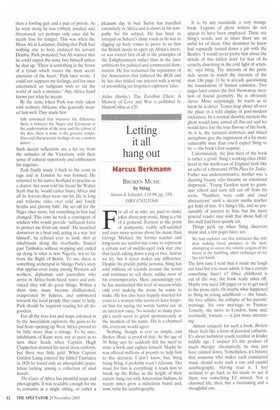Letting it all hang out
Marcus Berkmann
BROKEN MUSIC by Sting Simon & Schuster, £18.99, pp. 339, ISBN 0743231848 For all of us who are paid to make jokes about pop music, Sting is a bit of a godsend. Earnest to the point of pomposity, visibly self-satisfied and even more serious about his music than George Michael, the former teacher and long-term sex symbol has come to represent a certain sort of middle-aged rock star: one that needs taking down a peg or two. And so we try, but it never makes any difference. Despite his prickly public persona, Sting has sold millions of records around the world and continues to sell them, unlike most of his contemporaries. More astoundingly yet, he has maintained this level of success while only ever making the music he wants to make. He has also been happily married for years to a woman who seems to have forgiven him for saying the words `tantric sex' in an interview once. No wonder so many people's teeth seem to grind spontaneously at the mention of his name. His is a charmed life, everyone would agree.
Nothing, though, is ever so simple, and Broken Music is proof of that. At the age of 50 Sting says he suddenly felt the need to write a book and explain himself. Maybe he was offered millions of pounds to help him to this decision, I don't know, but, Sting being Sting, it probably wasn't relevant. The muse for him is everything: it leads him to break up the Police at the height of their career, hang out with Amazonian Indians, in recent times grow a ridiculous beard and, now, write his autobiography. It is, by any standards, a very strange book. Legions of ghost writers do not appear to have been employed. These are Sting's words, and at times there are an awful lot of them. One drummer he knew had reputedly turned down a job with the Beatles. 'I would never probe him about the details of this fabled story for fear of its veracity dissolving in the cold light of scrutiny,' says Sting. The intensity of the prose style seems to match the intensity of the man. On page 13 he is already questioning the foundations of human existence. Two pages later comes the first throwaway mention of fractal geometry. He is obviously clever. More surprisingly, he wants us to know he is clever. Tenses leap about all over the place in a wild display of post-modern tricksiness. In a normal showbiz memoir the ghost would have sorted all this out and we would have lost the true flavour of the book. As it is, the tortured sentences and mixed metaphors give the impression of a far more vulnerable man than you'd expect Sting to he — the book's first surprise.
Unfortunately, the first third of the book is rather a grind. Sting's working-class childhood in the north-east of England feels like an echo of a thousand 1970s Plays for Today. Father was undemonstrative, mother was 'a dazzling beauty who became an emotional shipwreck'. Young Gordon went to grammar school and soon felt cut off from his roots. 'Numbers were cold and cruel abstractions' until a decent maths teacher got hold of him. It's Sting's life, and so presumably of interest to him, but the more general reader may wish that about half of this stuff had been quietly cut.
Things perk up when Sting discovers music and, a few pages later, sex.
We had explored our first intimacies like children making blood promises in the dark, attempting to secure the volatile cargoes of the future in the fumbling, silent exchanges of our lips and hands.
The first time I read that it made me laugh out loud but you must admit, it has a certain something, hasn't it? Once childhood is out of the way, the book really takes off. Maybe you need 100 pages or so to get used to the prose style. Or maybe what happened to Sting in young adulthood — the bands, the love affairs, the collapse of his parents' marriage, his own marriage to Frances Tomelty, the move to London, fame and, eventually, fortune — is just more interesting.
Almost uniquely for such a book, Broken Music feels like a form of personal catharsis. It's about turbulent youth recalled in kinder middle age. I suspect it's the product of much therapy: alternatively, he may just have calmed down. Nonetheless, it's bizarre that someone who makes such considered music should write such a raw and candid autobiography. Having read it, I feel inclined to go back to his music to see if there was something I'd missed. Not a charmed life, then, but a fascinating and a thoughtful one.


























































































 Previous page
Previous page